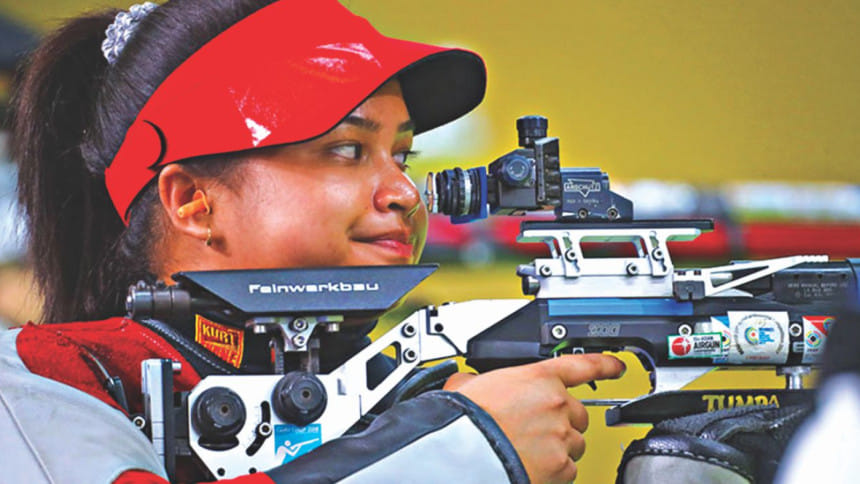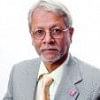Sports is about more than just participating

It is natural to assume that Australia's Gold Coast is strewn with aurous accolades for the picking. A little exploration would have revealed that close to four and a half thousand athletes from 71 countries and territories were vying for the 275 sets of medals this summer Down Under.
The 41-member Bangladesh delegation, merely 23 of them athletes (13 women) in batches, was the first contingent to reach Queensland about a week before the XXI Commonwealth Games, presumably to acclimatise themselves with the local conditions. It didn't quite pay off well.
Of the six events (shooting, swimming, boxing, weightlifting, wrestling and athletics) we participated in, officials, being realistic, pinned medal hopes only on shooting, given that most of our laurels in past Games came from that event. That prompts the question: What impelled the Bangladesh Olympic Association to send contestants in the other five events?
A sports headline in The Daily Star on April 9 read: "Fastest man and woman frustrate". That was the whole truth. The Bangladeshi man stood 53rd out of 65 sprinters and the woman 38th among a bevy of 41 in the 100m sprint. In the women's 200m, we fared even worse, because our celebrated fastest sprinter stood 36th out of as many in the contest; that's actually last. The mind is boggled to understand if 20 to 30 other countries could resist the temptation of sending their "fastest" man and woman to the competition, we should have rather promoted artistic and rhythmic gymnastics, para powerlifting, and cycling mountain bike, and we do have enthusiasts in each. The results would have been equally disappointing, if not less frustrating, because there is nothing "laster" than last.
With timings close to respectively 11 and 13 seconds, the outcome of either was hardly surprising, and should have been a foregone conclusion sitting at the BAAF Mirpur office. But the news item explained with a shade of optimism laced with sympathy that they had clocked fractions better at the National Championships as recent as last December. Here arises the matter of calibration of our timers with the Games standards; every fraction of a second counts towards glory or despair.
Our officials, sports judges, coaches and participants may have taken the Games motto "Share the Dream" too literally. Dreams have to be big and yet realistic. Dreams to be shared have to be seen when awake. Did they expect that the other 50 sprinters would fall flat on their face and our own perched on the victory stand?
These deshi torpedoes (we are rather generous with our admiration) have been holding on to their king/queen labels (I told you) for four to five years, and rightfully so, but that stagnation tells the complete story about the state of our athletics. Records have stood firm for over 20 years. It appears that others are not finding any interest, nor a level playing field to try hard enough. There lies the responsibility of the officials—some entrenched in the helm of affairs and even the committee for decades. To flourish internationally, a country must have self-respecting and knowledgeable officials who can set priorities, even to the extent of insisting that athletes not good enough to participate should not make up the numbers.
Gone are the times when a country participated in a spirit of camaraderie. Gone too should be the perception to fancy international participation as a gift for some home achievement or any unrelated socio-political affair. International competition is serious business, and has been for several decades now, especially with television (and slo-mo) making it possible for the world to ridicule any misconception.
The truly dignified are crestfallen by failures at global encounters. Would it not be laughable if Vanuatu (pop. 282,117), Cook Islands (pop. 17,380), Solomon Islands (pop. 623,281), British Virgin Islands (pop. 31,196) or Dominica (pop. 73,925) wanted to play a competitive cricket match against Bangladesh (pop. 166,368,149)? Some of us may not have even heard of these countries, but they have each won a medal at the recent Commonwealth Games. Indeed we got two silvers at Queensland, of course in shooting. Heartiest congratulations to Abdullah Hel Baki for his Silver in the men's 10m air rifle and Shakil Ahmed in the men's 50m pistol. By a twist of fortune, on any another day those could have been golds. However, save two other shooters, who reached the quarterfinals, others languished between 10th to 20th positions. Their experience is perhaps the nation's expensive gain.
In swimming, our two men and the lone woman managed ranks between 20th and 38th, mediocrity at their best. That may not look half as bad if you knew that the timing of the gold medallists in their respective events was more than three to seven seconds faster. That's imaginably like 20-0 in football.
In weightlifting, our male competitor "did not finish," aww…! Of the four women, one was sixth out of 13, and the rest were last or near about. Why, why did we send them?
Our wrestler in the men's freestyle 74kg was eighth out of 15 after he won the first round 4-0 against the entry from Kiribati (pop. 118,414), but went down 0-5 to a Nigerian in the next. What's the point?
About boxing, much more should be said, because boxing coach Abdul Mannan did not attend the scheduled technical committee meeting the day before the beginning of the bouts. As a result, the two Bangladeshi boxers were not allowed to take part. We have not heard in the media of punches being thrown at the truant coach, or did he have a reason? Even if he had any health issues, he should have shared that with the team management and saved our honour. "After the Games the whole incident will be investigated," was the General Team Manager Ashiqur Rahman Miku's response.
India is an example of in-depth all-round preparation, making possible a bull's eye prediction with punditry. Ten days before the Games, a report on "Chances of Indian athletes at 2018 Commonwealth Games" predicted 25 gold medals, 21 silvers, and 24 bronzes. In April they bagged 20 silvers, as many bronzes, and whopping 26 golds.
Compared to our neighbours, our dismal performance is a matter of collective shame. We share the same subcontinent, with common roots of history, language and culture, similar disposition of physique, taste for food, music and films, and therefore the contrast in achievement is of great concern this side of Benapole. The difference clearly highlights the inadequacies in our training team, facilities, and dedication of the athletes, and lack of effective long-term scientific planning.
I must end by drawing a silver lining. After the 2002 Manchester Commonwealth Games, four Bangladeshi athletes disappeared (The Guardian), and after the 2006 Melbourne Games, a lone Bangladeshi runner went missing (ABC news). This time around, our entire contingent returned, I think.
Dr Nizamuddin Ahmed is a practising architect, a Commonwealth Scholar and a Fellow, a Baden-Powell Fellow Scout Leader, and a Major Donor Rotarian.





Comments